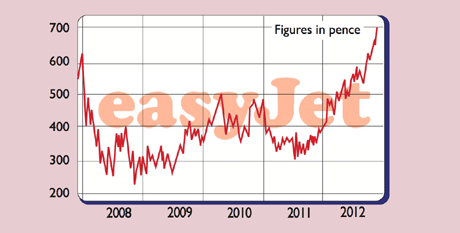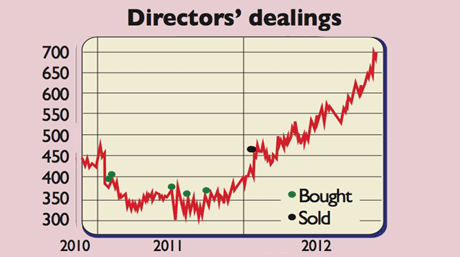Shares in focus: All aboard easyJet
Airlines rarely make good investments, but Stelios’s creation is an exception, says Phil Oakley. Here, he explains why.
Get the latest financial news, insights and expert analysis from our award-winning MoneyWeek team, to help you understand what really matters when it comes to your finances.
You are now subscribed
Your newsletter sign-up was successful
Want to add more newsletters?

Twice daily
MoneyWeek
Get the latest financial news, insights and expert analysis from our award-winning MoneyWeek team, to help you understand what really matters when it comes to your finances.

Four times a week
Look After My Bills
Sign up to our free money-saving newsletter, filled with the latest news and expert advice to help you find the best tips and deals for managing your bills. Start saving today!
Airlines rarely make good investments. Stelios's creation is an exception, says Phil Oakley
The business
EasyJet is one of Europe's best-known and largest airlines. It has an 8% share of the European short-haul market and flies passengers on more than 600 routes to most of Europe's major cities plus selected destinations in north Africa. The company has a very strong presence in the key markets of the UK, France, Italy and Spain.
EasyJet is a low-cost airline it passes on savings from its efficient business model to customers in the form of lower fares than traditional national airlines (the flag carriers). It has a fleet of 214, mainly Airbus, aircraft and owns around 70% of them. To generate the best returns they have to be in the air for more than ten hours a day. In the year to September 2012, easyJet carried more than 58 million passengers and had sales of £3.8bn.
MoneyWeek
Subscribe to MoneyWeek today and get your first six magazine issues absolutely FREE

Sign up to Money Morning
Don't miss the latest investment and personal finances news, market analysis, plus money-saving tips with our free twice-daily newsletter
Don't miss the latest investment and personal finances news, market analysis, plus money-saving tips with our free twice-daily newsletter
The history
The airline was founded in March 1995 by Stelios Haji-Ioannou (better known these days as just Stelios), a Greek-Cypriot entrepreneur. It started out with just two Boeing 737 aircraft based at Luton airport. In November of the same year it started flying to Glasgow and Edinburgh with tickets selling for as little as £29 for a one-way trip. The following year saw the firm start flying to Amsterdam, Nice and Barcelona. In 1997, it opened a second base at Liverpool and started selling tickets over the internet. By the late 1990s, it was carrying more than one million passengers a year. In 2000, the company was listed on the London Stock Exchange.
Over the next decade the company expanded rapidly by establishing new bases across Europe and buying other airline companies most notably Go, the budget airline that was set up by British Airways. By 2010, easyJet had created a thriving pan-European business and became the UK's largest airline.
EasyJet's name has always been synonymous with its founder Stelios. Although he is no longer a director of the company, he and his family still own more than a third of its shares. This means he tends to interfere with the running of it. In recent years, he's publicly criticised the chief executive, tried to get the chairman sacked and demanded big dividend payments. He hasn't always got his way, but some investors have found his influence unsettling. That said, he has created a good business. Unlike British Airways, easyJet has managed to remain consistently profitable during its time as a quoted company.
The chief executive
Carolyn McCall has been chief executive since 2010, having had no previous experience of the airline industry. She started out as a schoolteacher, but quickly gave that up to move into the media. McCall climbed the ladder at Guardian Media Group over 20 years, becoming chief executive in 2006. Called "an old media luvvie" by Ryanair's CEO Michael O'Leary on her appointment at easyJet, she seems to be doing a good job. She was paid £1.5m last year.
Should you buy the shares?
Airlines rarely make good investments. Up until quite recently, cheap money has meant that it's been relatively easy for new companies to start up and for existing ones to buy more planes. Lots of competition has meant that there has often been too many seats chasing too few passengers. Throw in higher fuel costs, weak economies and higher aviation taxes and you can see why many airlines yo-yo between profits and losses.

But the current economic climate might just put a stop to this madness. The big national carriers are struggling and need to cut back. This should mean capacity and competition on easyJet's main routes is unlikely to grow. It's also very difficult for airlines to get their hands on the money to buy new planes. EasyJet's key strength is that it has a business model that can thrive in these tough times. It flies to Europe's main cities, but importantly to its main airports too. This makes it a viable option for business travellers looking to save money, especially since it now has allocated seating, which gets rid of the usual scramble to get on board. People still want to go on holiday despite the growing strain on household budgets. That should mean good demand from tourists.
EasyJet's numbers look very impressive too. Unlike many of its peers, the firm has impeccable finances with virtually no debt on its balance sheet. It is true that it has to cover the lease costs on about 30% of its fleet, but its decent profits and cash flow mean that this is currently not a problem. It fills nearly nine out of every ten seats on its planes and makes decent returns on its assets. Eighty per cent of its fuel bill is hedged for the next year and £35m of costs is being taken out.
With the company adding just over 3% to its capacity, we think that sales and profits should keep on growing. Unusually for an airline, shareholders should see a decent chunk of these profits coming back to them. Thanks to Stelios's constant badgering, the directors of easyJet have decided to pay out one third of its net profits in dividends every year. With the shares trading on just over ten times 2013 expected earnings and offering a dividend yield of over 3%, we think they are still good value.
The numbers
Directors' shareholdings
C McCall (CEO):13,954C Kennedy (FD):13,985M Rake (chairman):11,282

What the analysts say
Buy:19Hold:5Sell:3Average price target:680p
Key facts
Stockmarket code:EZJShare price:693pMarket cap:£2.7bnNet assets (Sept 2012):£1.8bnNet debt (September 2012):£74mP/e (current year estimate):10.6 timesYield (prospective):3.30%Interest cover:13.7 times
Get the latest financial news, insights and expert analysis from our award-winning MoneyWeek team, to help you understand what really matters when it comes to your finances.
Phil spent 13 years as an investment analyst for both stockbroking and fund management companies.
-
 The ‘mirror will’ flaw which could mean your savings end up with strangers – how to protect your legacy
The ‘mirror will’ flaw which could mean your savings end up with strangers – how to protect your legacyWriting a will lets you pass your wealth onto your loved ones. But couples with a so-called ‘mirror will’ could unintentionally leave their family exposed to being cut out.
-
 Saba comes for Edinburgh Worldwide’s board... again
Saba comes for Edinburgh Worldwide’s board... againSaba Capital Management has announced fresh plans to displace the board of Edinburgh Worldwide despite having been decisively beaten in a recent vote
-
 Somero: trading this overlooked bargain
Somero: trading this overlooked bargainFeatures Mechanical-screed maker Somero dominates its niche and is attractively valued. Matthew Partridge picks the best way to trade it.
-
 How to find big profits in small companies
How to find big profits in small companiesCover Story The small- and micro-cap sectors are risky and volatile. But with careful research and patience, investors could make huge gains. Matthew Partridge explains how to find the market’s top tiddlers.
-
 The hidden gems on Aim, London's junior market
The hidden gems on Aim, London's junior marketFeatures Aim, London’s junior market, is risky – but you can find solid stocks at low prices. Scott Longley reports.
-
Three Aim-listed firms that will thrive in a post-Brexit world
Opinion Matt Tonge and Victoria Stevens of the Liontrust UK Smaller Companies Fund pick three Aim-listed firms that will survive Brexit turmoil.
-
Fetch! The Chinese small-cap stocks to buy in the Year of the Dog
Opinion Each week, a professional investor tells us where she’d put her money. This week: Tiffany Hsiao of Matthews Asia selects three Chinese small-cap stocks with exciting potential.
-
Small and mid-cap stocks with big potential
Opinion Professional investor Guy Anderson of the Mercantile Investment Trust selects three small and medium-sized firms with promising prospects that the market has missed.
-
 Get cheap, reliable growth from smaller companies
Get cheap, reliable growth from smaller companiesFeatures One of the most reliable long-term investment trends is the long-term outperformance of smaller companies over blue chips. Max King picks some of the best ways to buy into this growth.
-
 Now the bitcoin bubble’s burst, what’s the next big thing?
Now the bitcoin bubble’s burst, what’s the next big thing?Features Forget bitcoin, if you want to increase your wealth faster than most other people, you need to find the next big thing. Merryn Somerset Webb suggests some places to look.